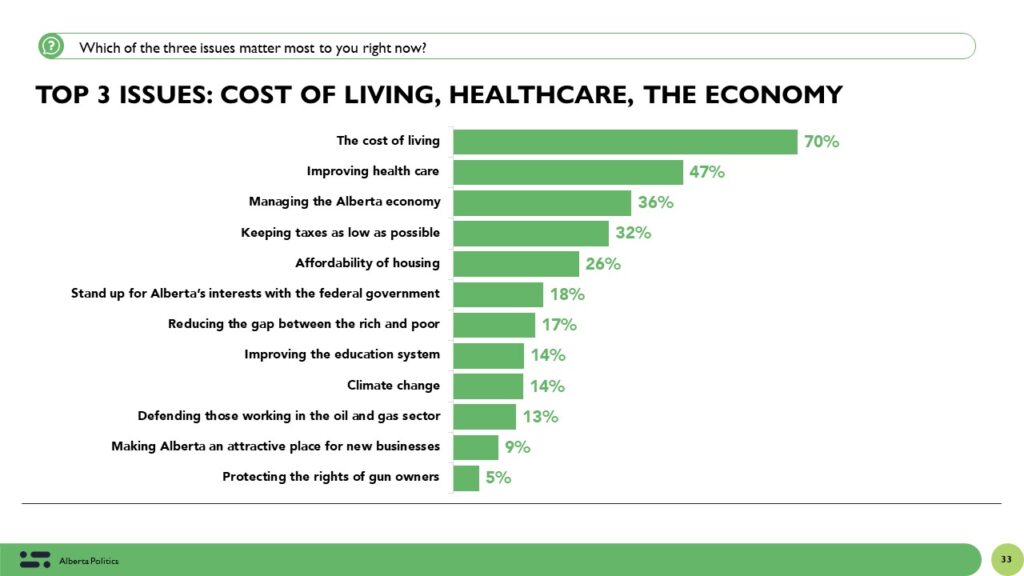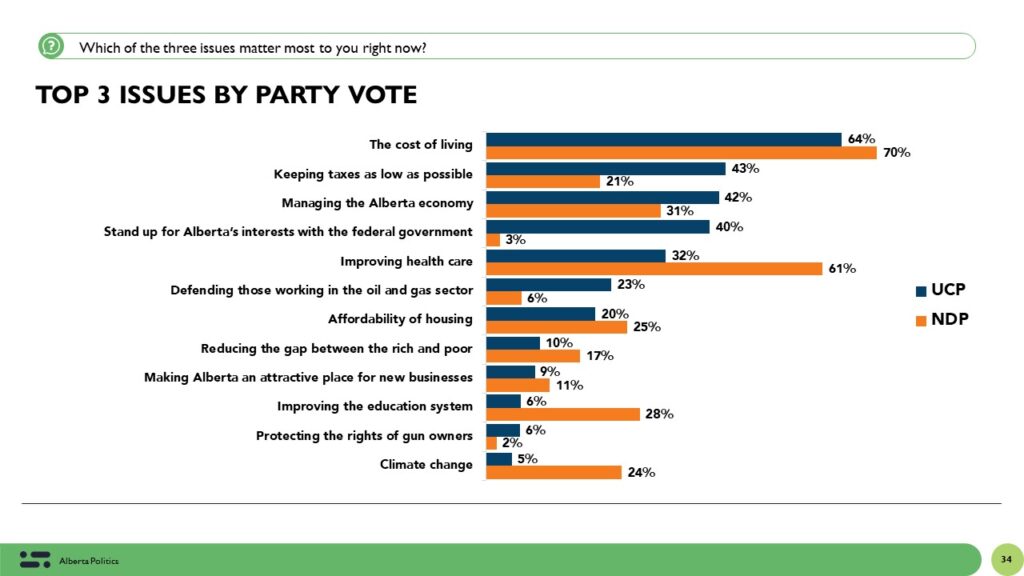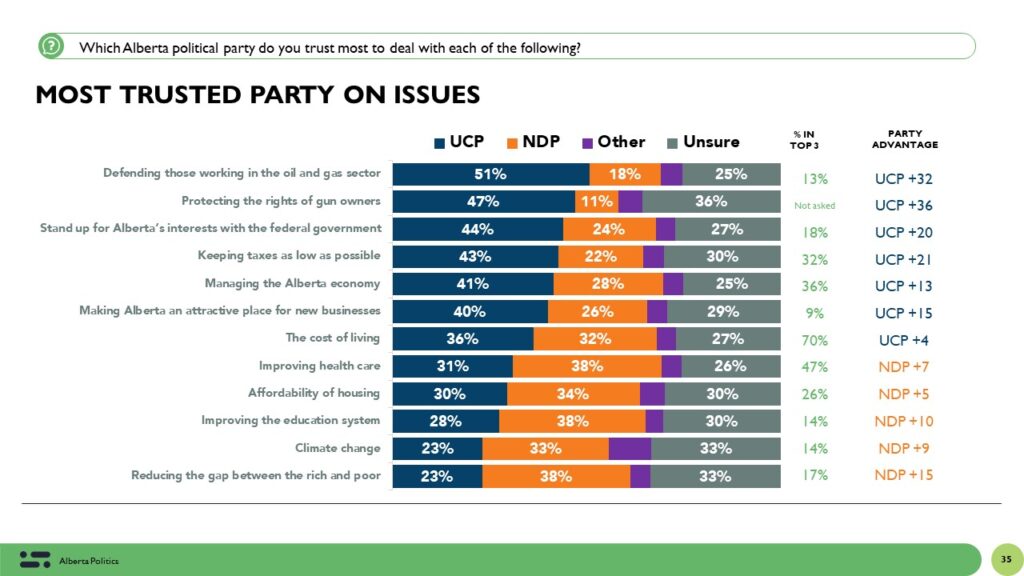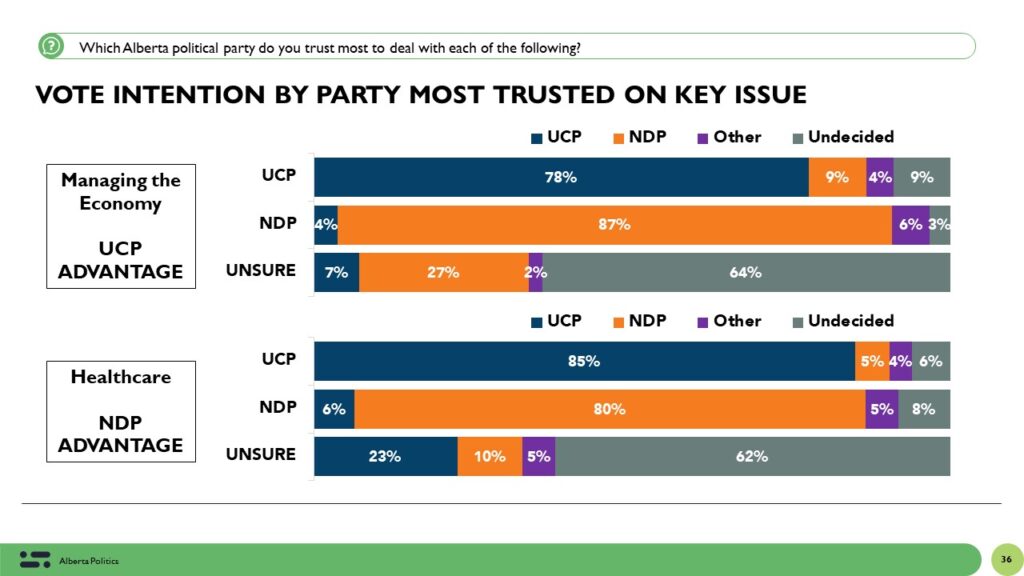Alberta Politics: The Issues & Who Albertans Trust Most on Them
April 28, 2023
Yesterday, we released the results of our pre-election Alberta survey looking at the horserace. The UCP and NDP are tied province-wide with the UCP slightly ahead in Calgary.
Today, we share results on questions exploring public impressions of the top issues and which party they trust most to deal with them.
Here’s what we found:
The cost of living, healthcare, and the economy are the top issues.
As with previous waves of research in Alberta, and across the country more generally, the cost of living is a top issue for a clear majority of Albertans.
Seven in ten rated it as one of their top three issues from a list of issues. Healthcare was second at 47% followed by managing the economy at 36%, keeping taxes as low as possible at 32% and the affordability of housing at 26%.

NDP and UCP voters don’t agree much on what the top issues are, but they do both agree that the cost of living is a top issue. 64% of UCP supporters and 70% of NDP supporters rated it as a top issue.
UCP voters are more likely than NDP voters to rate taxes, managing the economy, standing up to the federal government, and defending those working in the oil and gas sector as a top issue.
NDP voters are more likely than UCP voters to rate healthcare, housing affordability, reducing the gap between the rich and the poor, education, and climate change as a top issue.

Who do Albertans trust most to handle different issues?
As we’ve seen in past research, the UCP has a big advantage on issues related to defending workers in the oil and gas sector, protecting the rights of gun owners, standing up to the federal government, keeping taxes as low as possible, and managing the economy.
The NDP leads on reducing the gap between the rich and the poor, education, climate change, and healthcare.
There’s very little difference between the parties on the top issue – the cost of living.

One way to understand the impact of this on the vote is to look at the relationship between trusting a party most on an issue and how someone would vote.
Take managing the economy for example. The UCP has a 13-point advantage over the NDP on this issue (41% to 28%). Among those who trust the UCP most on managing the economy, 78% say they would vote UCP, 9% would vote NDP, and 9% are undecided. Owning this issue, in other words, doesn’t guarantee the UCP a vote.
Healthcare, on the other hand, is a better predictor of the vote. The NDP has a seven-point advantage on healthcare (38% to 31%) and among those who think the NDP is best on the issue, 80% are voting NDP while 6% are voting UCP and 8% are undecided. Like the economy, trusting a party on healthcare is a good predictor of the vote, but it’s not perfect.
But the key groups are those who say they are unsure which party is best on the issue. Of those who say they are unsure which party is best on the economy, 27% are voting NDP, 7% UCP, and 64% are undecided. If the UCP can improve its advantage on the economy and make more people think it’s best on it – it may be able to increase its vote share.
The same is true for the NDP on healthcare. Among those who are unsure who they trust most on healthcare, 23% would vote UCP, 10% NDP, and 62% are undecided. If the NDP can frame the choice in the election around healthcare, it may be able to increase its vote share.

This helps explain why Danielle Smith and the UCP government have been working hard to dispel the idea that it would charge patients to access a primary care provider and why the NDP continues to hit the government hard on this issue.
METHODOLOGY
The survey was conducted with 1,000 Alberta adults eligible to vote from April 21 to 25, 2023.
A random sample of panelists were invited to complete the survey from a set of partner panels based on the Lucid exchange platform. These partners are typically double opt-in survey panels, blended to manage out potential skews in the data from a single source.
The margin of error for a comparable probability-based random sample of the same size is +/- 3.1%, 19 times out of 20.
The data were weighted according to census data to ensure that the sample matched Alberta’s population according to age, gender, educational attainment, and region. Totals may not add up to 100 due to rounding.
This survey was paid for by Abacus Data Inc.
Abacus Data follows the CRIC Public Opinion Research Standards and Disclosure Requirements that can be found here: https://canadianresearchinsightscouncil.ca/standards/
ABOUT DAVID COLETTO
David Coletto is Chair, CEO and a founding partner of Abacus Data a full-service market research and strategy firm based in Ottawa and Toronto. With over a decade and a half of experience in the industry, David and his partners founded Abacus 12 years ago and since then David has become one of Canada’s most respected social researchers regularly commenting on politics, the labour market, and consumer behaviour.
He earned a PhD in Political Science from the University of Calgary in 2010 and is an adjunct professor at Carleton University. He is the host and producer of inFocus with David Coletto a podcast that explores the intersection of public opinion, politics, public policy, and consumer behaviour.
ABOUT ABACUS DATA
We are the only research and strategy firm that helps organizations respond to the disruptive risks and opportunities in a world where demographics and technology are changing more quickly than ever.
We are an innovative, fast-growing public opinion and marketing research consultancy. We use the latest technology, sound science, and deep experience to generate top-flight research-based advice to our clients. We offer global research capacity with a strong focus on customer service, attention to detail, and exceptional value.
We were one of the most accurate pollsters conducting research during the 2021 Canadian election following up on our outstanding record in 2019.
Contact us with any questions.
Find out more about how we can help your organization by downloading our corporate profile and service offering.



